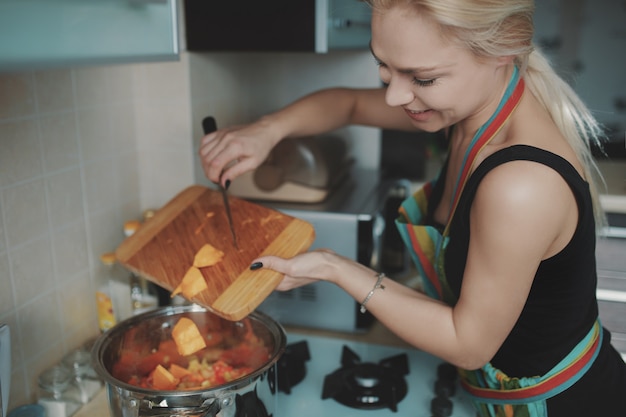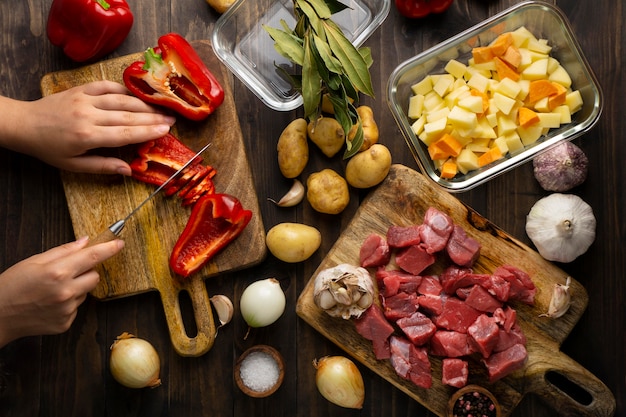Ah, the eternal question that haunts every leftover chicken enthusiast: just how long can you safely keep that delicious roast in the fridge before it becomes a risky proposition? We've all been there, staring at a half-eaten chicken, a little unsure about that faint smell. Maybe it's just our imagination, right? Or is it a sign of something more sinister lurking beneath the surface? Let's dive into the science, the guidelines, and the good old-fashioned gut feeling to find out how long cooked chicken can truly stay in the fridge, because trust me, nobody wants to be on the receiving end of a nasty case of food poisoning.
(Part 1) Unveiling the Microscopic World: A Tale of Bacteria

Before we tackle the fridge, let's peek into the microscopic world where the real story unfolds. Bacteria, those tiny, invisible creatures, are everywhere, and they absolutely love food. Now, when we cook chicken, we're essentially waging war against these bacteria, using heat as our weapon. But, just like any good battle, there are casualties and survivors. While most of the bacteria are eradicated, a few sneaky ones can manage to evade our culinary assault, waiting for their chance to multiply. And that's where the fridge steps in as our valiant ally.
The Fridge: A Chilling Battleground
The fridge, with its cool embrace, slows down the growth of bacteria. It doesn't eliminate them completely, but it does a fantastic job of keeping them in check. The lower temperatures create an environment where bacteria can't reproduce at the same breakneck speed they would at room temperature. So, while the fridge is an effective tool, it's not a magical solution.
The "Danger Zone": A Bacteria Paradise
The "danger zone," a term that should be whispered with caution, is the temperature range between 4°C (40°F) and 60°C (140°F). Within this zone, bacteria thrive, multiplying at an alarming rate. So, if cooked chicken is left out at room temperature for even a short period, it's like setting up a buffet for bacteria. That's why it's crucial to refrigerate cooked chicken as quickly as possible, and never leave it out for more than two hours.
(Part 2) The Official Word: When to Draw the Line

Now, the burning question: just how long can we reasonably expect to keep cooked chicken in the fridge before it becomes a culinary gamble? The Food Standards Agency (FSA) in the UK, our reliable source of food safety information, recommends a maximum of three to four days.
The "Use-By" Date: The Ultimate Authority
Don't be fooled by the "best before" date you might see on packaging. The "use-by" date is the ultimate authority, the non-negotiable deadline. Once that date has passed, it's best to bid farewell to your chicken, even if it looks and smells perfectly fine. Don't even contemplate freezing it, as that won't magically reset the clock.
Leftover Chicken: A Separate Battle
We've all been there - a delicious chicken dinner, and now a tempting pot of leftovers staring back at us. The good news is, the same three to four-day rule applies to leftover chicken. So, pop it in the fridge as soon as it's cool enough, and make sure to devour it within that time frame. If you can't, it's time to say goodbye, even if your heart is breaking.
(Part 3) The Art of Safe Storage: A Symphony of Prevention

Now that we know the time limits, let's delve into the art of keeping cooked chicken safe in the fridge. It's all about minimizing the bacteria's chances of winning the battle.
Cooling Down: A Race Against Time
Don't be tempted to rush that hot chicken into the fridge. It's a recipe for disaster, raising the temperature inside the fridge and creating a breeding ground for bacteria. Instead, transfer it to a shallow container. Another trick is to submerge it in a bowl of ice water, changing the water every 30 minutes. This helps cool it down quickly and creates a more hospitable environment for your fridge.
Packaging: The Armor of Protection
Once the chicken is cool, it's time to wrap it up properly. Cling film works, but I prefer airtight containers. They keep the air out, preventing the chicken from drying out and also making it easier to stack in the fridge, reducing the risk of cross-contamination.
The Fridge: A Well-Ordered Battlefield
Don't forget the importance of a well-maintained fridge. Ensure it's set at the correct temperature, around 4°C (40°F). Invest in a fridge thermometer to double-check regularly. And, keep the chicken on a lower shelf, away from raw meats. This helps prevent any unwanted cross-contamination, keeping things clean and organized.
(Part 4) The Senses: Our Trusted Allies
Even after meticulous storage, there's always a lingering doubt. That's where our trusty senses come in, providing a final checkpoint before we take the plunge.
The Smell Test: The First Line of Defense
Our noses are incredibly sensitive, able to detect subtle changes in food. If the chicken has a sour or off-putting smell, it's a clear indication that it's no longer safe to eat. Don't try to mask the smell with spices or sauces - trust your nose, it's usually right.
The Look Test: Visual Inspection
While the smell test is a powerful ally, a visual inspection can also provide valuable clues. If the chicken has changed colour, from a healthy white to a grayish or greenish hue, it's a sign that it's gone bad. Any slime or mold is a definite no-go.
The Touch Test: A Gentle Probe
Finally, we have the touch test. If the chicken feels slimy or sticky, it's a sure sign that bacteria are having a party on its surface. However, I'd caution against touching raw chicken unless your hands are thoroughly washed.
(Part 5) Freezing: A Risky but Potentially Rewarding Strategy
Now, what about freezing cooked chicken? Can we extend its shelf life further? Yes, it's safe to freeze, but it comes with its own set of risks and rewards. Freezing can alter the texture, making the chicken drier and less flavorful.
Freezing: The Rules of Engagement
If you're ready to take the leap and freeze your cooked chicken, follow these rules: ensure it's properly cooled down before freezing, pack it tightly in an airtight container or freezer bag to prevent freezer burn, and maintain a freezer temperature of 0°F (-18°C) or lower. Most importantly, freeze it for no more than two to three months. Remember, freezing doesn't kill bacteria, it merely slows them down.
Thawing: A Delicate Dance
When it's time to bring your frozen chicken back to life, the safest and best method is to thaw it in the refrigerator. It might take a while, but it's worth it for the safety and quality. You can also thaw it in the microwave, but be cautious and avoid cooking it. Never thaw it at room temperature, as that's a bacterial breeding ground.
The Verdict: A Matter of Preference
So, freeze or not freeze? It's a matter of personal preference. If extending shelf life is a priority and you're willing to accept some texture changes, freezing is an option. But, if you want to savor the best flavor and texture, it's best to eat your cooked chicken within those three to four days.
(Part 6) Chicken Soup: A Culinary Safe Haven
Ah, chicken soup, the ultimate comfort food. When you're feeling under the weather, there's nothing better than a warm bowl of this classic remedy. But what about the chicken? Is it safe to use cooked chicken in soup? Good news, it is!
Boiling: A Final Stand
Boiling, when done correctly, is a powerful weapon against bacteria. So, by simmering your soup, you're essentially giving the chicken a second heat treatment. Ensure you boil the soup for at least 15 minutes to make sure any lingering bacteria are eliminated.
Storage: Keeping the Soup Safe
Once your soup is ready, let it cool down completely before storing it in the fridge. You can keep it for up to three to four days, following the same guidelines as for any other cooked chicken. And if you want to freeze it, go ahead! Just keep it for no more than two to three months.
(Part 7) Chicken Sandwiches: A Culinary Conundrum
Chicken sandwiches, those portable delights. But how long can you keep them in the fridge? This one is a bit trickier. The bread can absorb moisture from the chicken, becoming soggy and unappealing. And mayonnaise, a popular ingredient, can go rancid if it sits in the fridge too long.
The Sandwich Rule: A Tight Timeline
Generally, it's best to consume your chicken sandwich within one to two days. This allows for the flavors to meld and the sandwich to retain its freshness.
Tips for Storage: A Sandwich Strategy
If you're determined to extend the shelf life, here are some tips: separate the bread from the chicken, store them in separate containers, and add mayonnaise right before eating. This helps prevent the bread from becoming soggy, the chicken from drying out, and the mayonnaise from going rancid.
(Part 8) The "Best Before" Date: A Misleading Myth
You've likely noticed the "best before" date on many food products, including chicken. But it's not the same as a "use-by" date. It's merely a guideline for peak quality, not a safety deadline.
"Best Before" Deception: A Common Trap
I've been fooled by the "best before" date many times, throwing away perfectly good food just because the date had passed. But, if the food looks, smells, and feels good, it's probably still safe to eat. Use your judgment, but be cautious.
"Use-By" Date: The True Authority
When it comes to cooked chicken, it's all about the "use-by" date. This date is non-negotiable and it's for a reason. It's the safety guideline, and it's always best to stick to it.
(Part 9) The Chicken Dilemma: To Eat or Not to Eat?
After all this information, the decision ultimately rests with you. There are no strict rules, only guidelines and best practices. If you're unsure, err on the side of caution and discard the chicken. But if you feel comfortable with the risk, and the chicken looks, smells, and feels fine, go for it.
My Personal Approach: A Touch of Caution
Personally, I've always been more cautious with cooked chicken, having had a few close calls with food poisoning. I follow the storage rules meticulously, check the date, and use my senses to judge freshness. And if I have any doubts, I throw it away.
The Importance of Awareness: A Lifelong Lesson
The key is to be aware of the risks and make informed decisions. Don't be afraid to ask questions, research, and trust your instincts. And, above all, practice good hygiene, wash your hands thoroughly, and keep your kitchen clean. These simple steps can make a huge difference in preventing foodborne illnesses.
FAQs
Here are some of the most common questions about cooked chicken and the fridge:
1. Can I Keep Cooked Chicken in the Fridge for More Than Four Days?
It's not advisable. While some people might get away with it, the official guideline is three to four days. Beyond that, the risk of bacterial growth increases significantly, and it's not worth the risk.
2. Can I Freeze Cooked Chicken for Longer Than Three Months?
It's not recommended. Freezing slows down bacterial growth but doesn't eliminate it. After three months, the quality deteriorates, and it's more likely to be unsafe.
3. Can I Reheat Cooked Chicken Multiple Times?
Technically yes, but it's not ideal. Every reheating dries out the chicken and reduces flavour. It also increases the risk of bacterial growth. Reheat it once and consume within a day or two.
4. Can I Use Cooked Chicken in Salads or Sandwiches After it's Been in the Fridge for a Few Days?
It's best to avoid using cooked chicken in salads or sandwiches after more than a day or two. Mayonnaise can go rancid, and the chicken can become less palatable. Use it fresh for the best results.
5. Can I Tell If Cooked Chicken is Bad Just by Looking at It?
Not always. Sometimes, chicken can look fine but be bad. Always use your senses (look, smell, touch) to determine freshness. And, if in doubt, discard it. Better safe than sorry.
Hopefully, this guide has cleared up the mysteries surrounding cooked chicken and the fridge. Prioritize food safety, be aware of the risks, and enjoy your chicken!
Everyone is watching

Perfect Rice Every Time: The Ultimate Guide to Cooking Rice
Cooking TipsAs a self-proclaimed foodie, I've always been a bit obsessed with rice. It's the foundation of countless cuisi...

Ultimate Guide to Cooking the Perfect Thanksgiving Turkey
Cooking TipsThanksgiving. Just the word conjures up images of overflowing tables laden with delicious food, the scent of r...

The Ultimate Guide to Cooking Asparagus: Tips, Techniques, and Recipes
Cooking TipsAsparagus. The mere mention of this spring delicacy conjures up images of vibrant green spears, crisp and burs...

Can You Cook Spaghetti with Gasoline? (The Shocking Truth)
Cooking TipsWe've all seen those crazy internet trends. You know, the ones that make you wonder, "Did someone actually try...

Chorizo and Eggs Recipe: The Ultimate Guide
Cooking TipsRight, let’s talk about chorizo and eggs. You know, that classic Spanish dish that's always a winner. It's th...
